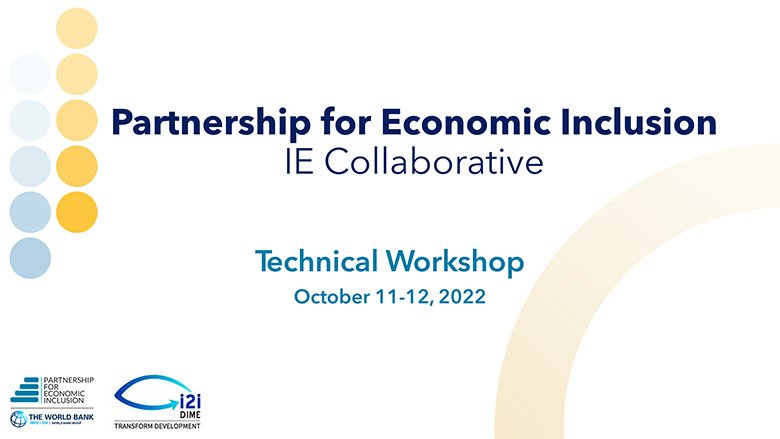On Oct 11th and 12th, 2022, DIME and the Partnership for Economic Inclusion (PEI) convened a two-day hybrid Impact Evaluation (IE) Technical Workshop with eight World Bank country operations – Dominican Republic, Ecuador, Ethiopia (1 rural project and 1 urban project), Liberia, Mexico, Tanzania, and Turkey. The event follows a recent launch of PEI’s IE Collaborative in partnership with DIME and broader partners to fill critical knowledge gaps and support the curation and analysis of evidence on impact and cost-effectiveness of government-led economic inclusion programs. The key objectives of the technical workshop were: i) to provide a space for research teams supporting these operations to share their IE designs, discuss implementation challenges, and receive feedback from sector experts; and ii) to encourage cross-learning and further collaboration among the participating teams, PEI, and DIME. The event complemented the recent in-person IE Policy Workshop hosted in Lisbon, Portugal (May 2022) in which PEI, DIME, and partners provided technical assistance to policymakers from nine country operations to initiate the design of their respective IE studies.
The technical workshop was structured around one policy panel and three thematic technical sessions. During the policy panel, experts engaged in a roundtable discussion on open questions on how to effectively scale-up government-led economic inclusion programs. The thematic technical sessions allowed research teams to discuss their IE designs based on common learning priorities: a) the scale-up of large government-led economic inclusion programs, b) alternative delivery modalities than can enhance scalability of these programs, and c) economic inclusion programming targeted at poor refugees. Main takeaways from panel and sessions were: a) the need to improve survey tools to properly measure economic inclusion outcomes (especially those related to gender), and the necessity to effectively integrate mixed methods and admin/M&E data into this equation; b) the importance of supporting innovations and partnerships at the local and institutional level to address key challenges to scale-up these programs using government systems; c) the need to better integrate livelihoods programming to climate change and resilience; and d) how to manage the transition of economic inclusion programming into urban contexts, solve the constraints generated by the increasing informality in cities (given COVID-19), and properly measure indirect effects generated by these programs.
